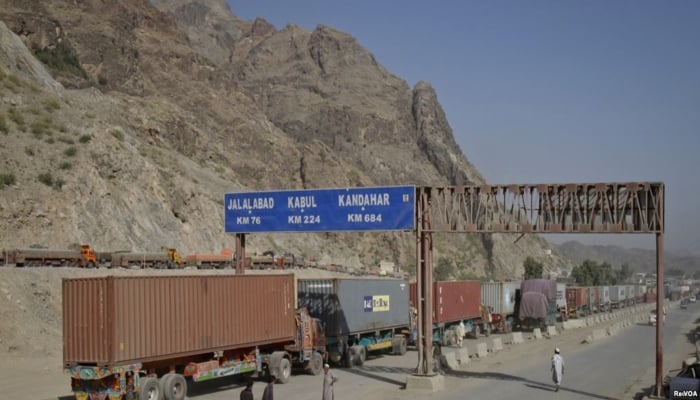Movement at Kharlachi border crossing resumes after clashes between Parachinar tribes 'end'
Deadly fighting between warring tribes has stopped, peace restored in region, say police
KURRAM: Following closure of the Kharlachi border crossing for nine days due to clashes between rival tribes, the Pak-Afghan border authorities on Tuesday said the crossing point was reopened for trade in the Kurram district.
The deadly fighting between tribes had stopped and peace was restored in the region, said police, adding that the law enforcement agencies personnel had been deployed at key locations.
Residents of the area faced profound difficulties because of the closure of border as food commodities, medicines, fuel and other daily use items had gone scarce.
It should be noted that following days of deadly clashes, the warring tribes had agreed to a ceasefire earlier as well that lasted for about a month.
Khyber Pakhtunkhwa (KP) Governor Faisal Karim Kundi, on September 27, said that at least 60 people had died and dozens others were injured as violence erupted once again in the region.
Speaking to the media, Governor Kundi had said: "As many as 60 people have died in Parachinar and dozens are injured."
The governor's remarks came about a week after the second round of clashes began over construction of trenches and continued unabated for multiple days.
The dispute involved two rival tribes who had been fighting over a piece of land. In August, the two sides had reached a two-month ceasefire after the armed clashes resulted in 50 casualties and wounded 226 others.
Police had said that clashes had been reported at various places with the fighting resulting in the closure of the Peshawar-Parachinar road.
Due to the closure of roads and markets, people were facing severe difficulties, including scarcity of food items, medicines and fuel, The News had reported.
Private Schools Management Chairman Mohammad Hayat Khan, on September 27, said it had been one week since the educational institutes were shut down. Whereas, Kurram Deputy Commissioner Javedullah Mehsud had said measures were being taken to reopen routes and establish permanent peace by preventing the clashes with the help of the tribes' elders and jirga members.
The clashes took place between the tribes in central Kurram and tribes in Balishkhel area, which intensified the violence and spread to Pewar, Teri Mangal, Kanj Alizai, Maqbal, Para Chamkani, Karman, Sadda, Balishkhel, Sangeena, Khar Killay and other areas.
Elders belonging to the Turi-Bangash tribes had called for immediate action from the authorities to resolve the issue amicably.
Meanwhile, separate jirgas of different tribes were convened that discussed ways and means to effect a ceasefire and restore a lasting peace in the area.
The elders had warned that if the district administration and other institutions failed to end the clashes, the tribes would take their own measures to restore peace.
Addressing a tribal jirga in Parachinar, tribal leaders Jalal Bangash, Engr Hamid Hussain, a Member of the National Assembly and parliamentary leader of the Majlis Wahdat-e-Muslimeen (MWM), Malik Zaman Hussain and others had said that no one would benefit from the ongoing conflict and that a trivial issue between two families escalated into violent clashes due to the negligence of the administration and other responsible authorities.
-
Security forces gun down 30 terrorists in multiple IBOs in KP: ISPR
-
MQM-P calls for new province in Sindh
-
US report validates Pakistan military edge over India: PM
-
Banned TTP poses serious threat to Pakistan security: UNSC panel
-
CM Afridi clarifies remarks on by-poll after ECP requests army deployment
-
Dubai sees 3.2m Pakistani passengers in 2025 as airport sets new milestone
-
Security forces kill 23 Indian proxy terrorists in KP's Kurram
-
Pakistan to construct island to boost oil exploration: report












